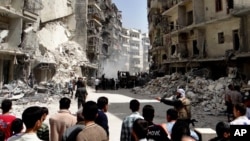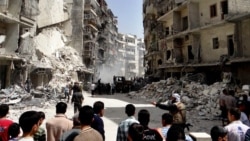It’s been more than two years since a handful of boys in Syria sprayed graffiti on a wall in Deraa calling for the end of the rule of Bashar al-Assad; since thousands of peaceful protestors took to the streets in Syria demanding more freedom and an end to corruption; since Assad’s military turned tanks, planes and mortars against the Syrian people, resulting in the deaths of 70,000 – with the toll rising every day.
Nations across the world have called on Assad to end the violence, step aside, and allow for a political transition in Syria. But he has vowed to stay, and his one Middle East ally and friend, the Iranian regime, seems determined to help him cling to power.
U.S. Ambassador to Syria Robert Ford testified before the House Committee on Foreign Affairs that Iran’s military aid to Syria and to the Iranian-backed terrorist group Hezbollah which is fighting inside Syria on Assad’s behalf, has been stepped up in recent months:
“They are plussing up [increasing] their assistance; they’re plussing up their people on the ground; they’re plussing up what they’re sending in.”
The Iranian assistance is so significant, Mr. Ford said, that the IRGC’s Qods force “lost a general” in recent fighting in Syria, among other personnel:
“And of course I don’t want to fail to mention that Lebanese Hezbollah is also playing a pernicious role. . .So this is a serious problem, and it is absolutely prolonging the conflict.”
Ambassador Ford said he believes the increase in Iranian support for Assad shows that Iran’s leaders “are very nervous about the Assad regime’s long term prospects…And they ought to be nervous…The military balance has shifted strongly against the [Assad] regime in a war of attrition.”
Mr. Ford noted that Syrians who oppose the regime are palpably angry at the help Iran and Hezbollah have given to Assad’s bloody campaign to crush the Syrian people, and that a post-Assad government in Syria will not want the same relationship with Iran and Hezbollah.
Ambassador Ford said the end of the Assad regime in Syria will present “new strategic opportunities” for stability in the Middle East: “Iran’s losing access to Lebanon through Syria will help Lebanon. In addition,” he said, “losing the Assad alliance will make it harder for Iran to spread its influence through terror groups that have worked with Syria and with Iran.”
Nations across the world have called on Assad to end the violence, step aside, and allow for a political transition in Syria. But he has vowed to stay, and his one Middle East ally and friend, the Iranian regime, seems determined to help him cling to power.
U.S. Ambassador to Syria Robert Ford testified before the House Committee on Foreign Affairs that Iran’s military aid to Syria and to the Iranian-backed terrorist group Hezbollah which is fighting inside Syria on Assad’s behalf, has been stepped up in recent months:
“They are plussing up [increasing] their assistance; they’re plussing up their people on the ground; they’re plussing up what they’re sending in.”
The Iranian assistance is so significant, Mr. Ford said, that the IRGC’s Qods force “lost a general” in recent fighting in Syria, among other personnel:
“And of course I don’t want to fail to mention that Lebanese Hezbollah is also playing a pernicious role. . .So this is a serious problem, and it is absolutely prolonging the conflict.”
Ambassador Ford said he believes the increase in Iranian support for Assad shows that Iran’s leaders “are very nervous about the Assad regime’s long term prospects…And they ought to be nervous…The military balance has shifted strongly against the [Assad] regime in a war of attrition.”
Mr. Ford noted that Syrians who oppose the regime are palpably angry at the help Iran and Hezbollah have given to Assad’s bloody campaign to crush the Syrian people, and that a post-Assad government in Syria will not want the same relationship with Iran and Hezbollah.
Ambassador Ford said the end of the Assad regime in Syria will present “new strategic opportunities” for stability in the Middle East: “Iran’s losing access to Lebanon through Syria will help Lebanon. In addition,” he said, “losing the Assad alliance will make it harder for Iran to spread its influence through terror groups that have worked with Syria and with Iran.”






